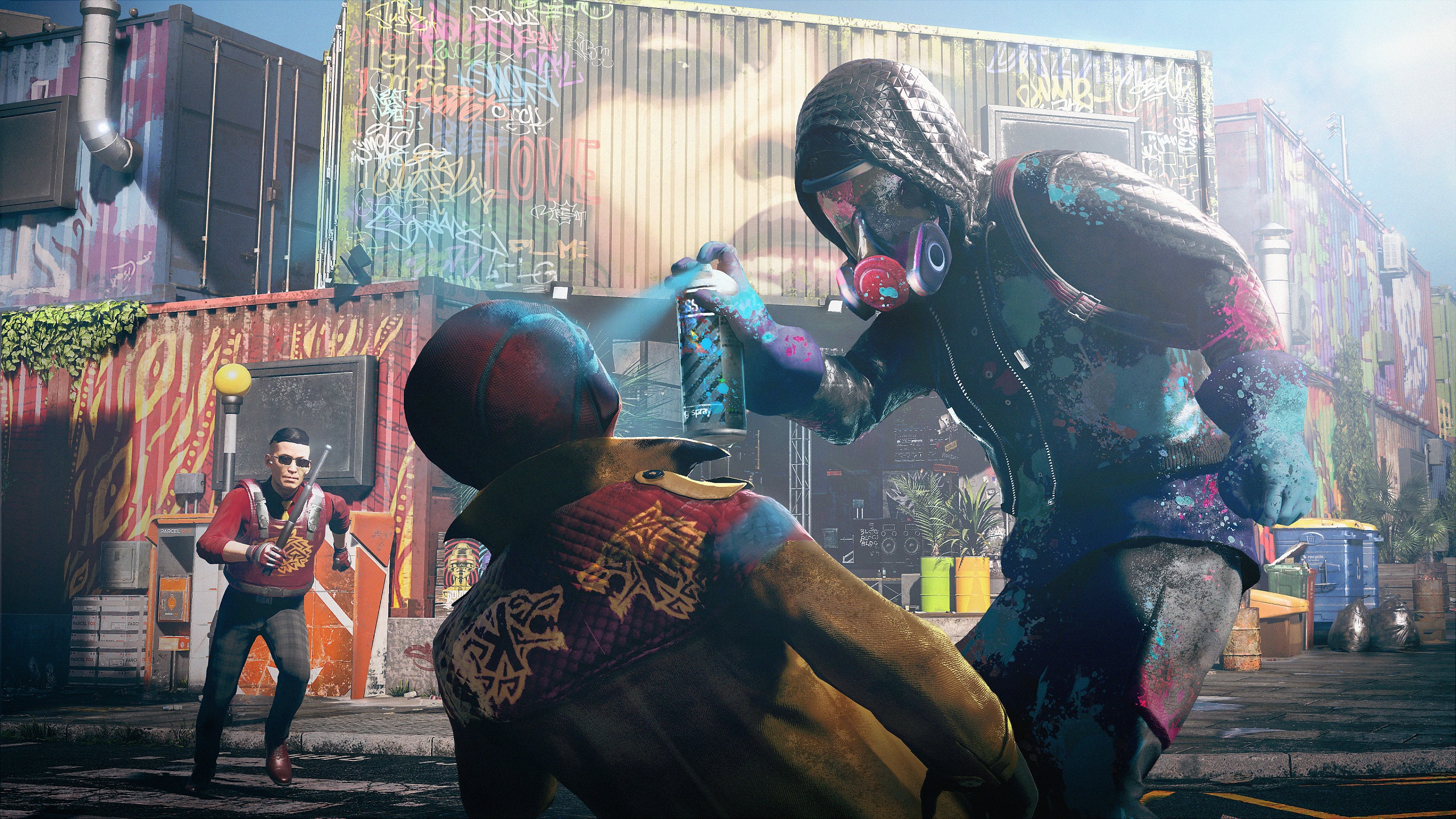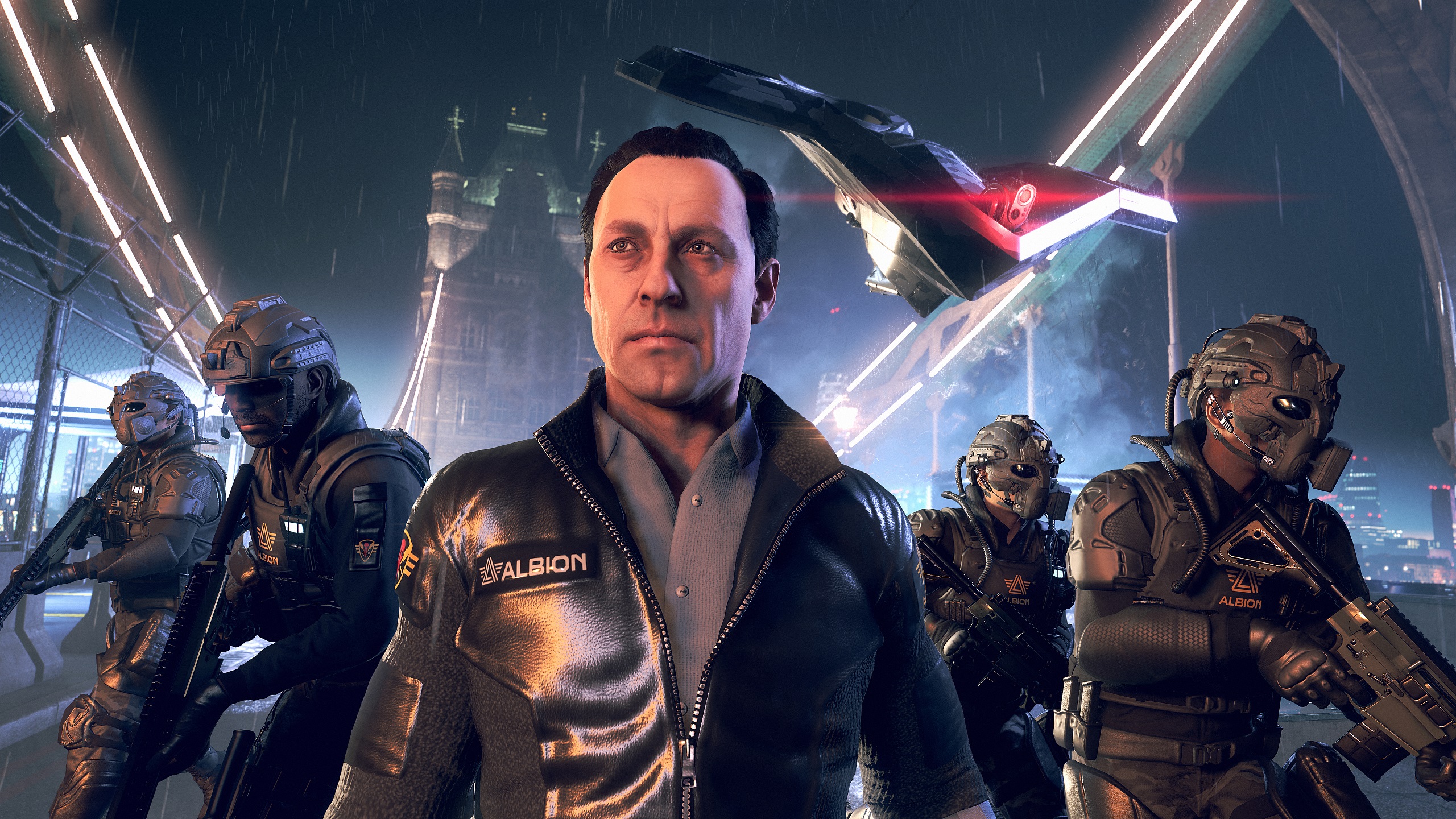Watch Dogs: Legion has always had an incredibly exciting pitch: combat an authoritarian surveillance state not as a single hero, but as an insurgent movement where you can play as almost anyone at anytime, from every background and walk of life. On the other hand, Ubisoft has a confining template for the games it makes: you get a map jammed with major and minor activities that let you take part in stealth and action sequences that are passable at best. The tension between the two was palpable during the long hands-on I had with the game last week in advance of the Ubisoft Forward event that the French publisher ran in place of its usual E3 demos.
The press side of the Ubisoft Forward was similar to most Ubisoft demos I’ve attended insofar as it gave players a long, cohesive section of the game with a variety of potential activities. The difference was that the entire session was done over the Parsec game streaming service, linking the computer I was playing on with a host machine in an Ubisoft office. It was not a perfect solution, especially since my internet connection started to fail a couple hours in: frames dropped like flies and at times the compression was so bad I struggled to read environments, and input lag was a persistent companion through the session.
The Ubisoft E3 event usually includes pretty extensive interview opportunities. That was not the case here. While the planning for this considerably predated the wave of public allegations that have embarrassed the company and implicated a number of senior studio leadership, the absence of Ubisoft developers in the event was noteworthy. The event was led by Ubisoft PR staff (a part of the company that has been just as implicated amid these scandals), and all the interactions were focused on technical questions around the stream. More than they have before, Ubisoft’s games had to speak for themselves. For Watch Dogs: Legion, this proved to be a struggle.

In Watch Dogs: Legion's even tackier near-future version of London than the one we enjoy today, a series of false-flag terror attacks resulted in the government building a privatized surveillance state to buttress its authoritarian politics. Privacy and anonymity have largely ceased to exist as citizens go about their days under the gaze of CCTVs, unmanned aerial vehicles (used for both military occupation and last-mile delivery), and a brutal private security force called Albion. The backlash to this crackdown has caused widespread unrest and turned the scapegoats for the terror attacks, the hacktivist group DedSec, into folk heroes. Now its scattered survivors must rebuild their clandestine movement and wage a guerilla resistance campaign by turning the tools of automation and mass surveillance against their masters. There is no main player-character: anyone could be a DedSec agent, and everyone’s abilities and background give them some special capabilities and weaknesses that they bring to the fight.
Here’s what I did in my demo with the game. I recruited an ex-spy by talking to her on the street and hearing about her gambling problem, then driving to see one of her friends to discuss the gambling problem, then driving to a loading dock where my prospective agent was now being held hostage by her bookie. I rescued her by taking her twenty feet outside the loading dock. Then she became part of my team, available for all sorts of missions. She was a master of “gun kata” takedowns.
I undermined the regime by going to a large recruitment billboard for the security services and changing the text to YOU ARE NOT ILLEGAL and spraypainting creepy gasmasks over all the officers’ faces. It really dealt them a blow, instantly increasing the region’s “Defiance Level”. Then I blew up a computer terminal in a garage, and hacked a panel that shut down the local surveillance network. That unlocked the final mission for the district. I met an informant who had secret information about the police tech infrastructure. I found her waiting for me on a sidewalk, wearing spiked hair and goth-y makeup, because Britpunk casts a long shadow over this game. She didn’t seem to have any inside information or connection with the police. She’d just been “doing some hacking” and discovered how to blow up the surveillance server farm. She was nervous about being found-out. “I’m with DedSec” my agent told her, and she immediately told me everything. It involved going to a Shard-like skyscraper and hacking a drone to drop a battery down what looked like a Death Star’s thermal exhaust port. Once I did that, I got a cutscene of happy Londoners celebrating in the streets outside. “Yeeeeah way to go DedSec!”

Then I advanced the story by rescuing a whistleblower. He contacted me in a fake Starbucks, arranging for a barista to deliver a flip phone with my character’s check. It self-destructed seconds later. My cheeky AI helper immediately got his location, but he’d already been taken by the police and dragged to a construction site where they were beating him. I used my original character, a construction worker, to breeze into the site unchallenged. Then, like always in these games, I used the bizarrely plentiful electrical boxes scattered around the level to electrocute patrolling guards after summoning them with a strange noise. Having rescued my whistleblower, who also turned out to be another ex-government spy, I helped him recover his dossiers to protect him and his fellow agents. I sneaked into a government building and aligned power circuits so that bad “red” circuits were filled with good “blue” energy that unlocked a key security panel, which then let me download the contents of a server.
Watch Dogs has always been a series that leverages the extremely well-founded fears of our increasingly panoptic digital society to sell a slightly-clunkier combination of Grand Theft Auto and Assassin's Creed. It’s more captivated by technology than it is critical of it. Watch Dogs: Legion has, by accident or prescient design, arrived alongside its political moment. The tech giants are fully unmasked as engines for economic monopoly and political oligarchy. The reputation of the police is a shambles. The companies building the future of digital surveillance and predictive policing have repeatedly been shown to be outright enemies of anything recognizable as a free and equitable society. Watch Dogs: Legion offers a world where those forces were allowed to grow even more unchecked than they are now, when they have basically routed all the forces opposing them, and then suggests that as players we will get to start the work of demolishing this rotten edifice.
But the premise always felt at odds with what I was playing during my lengthy demo. The frictionless nature of the game, so much of a part of the Ubisoft template, waters down the paranoia and vulnerability implied by the premise. The enemy has eyes everywhere, yet people announce their allegiance to DedSec like they’re climbing into an Uber: “Are you a cop? Oh, DedSec? Great, I’m on my way to commit treason.” There was little sense of pushback in the demo I played, and therefore little risk or vulnerability. I would have killed for a little bit of the “heist on a timer” tension of Invisible Inc. or the dour futility of Shadowrun: Dragonfall where it is very clear that your real power as a hacker is the fact that you’re probably too unimportant to piss off anyone who matters. In Watch Dogs: Legion, where Banksying a recruiting poster leads to a massive civil awakening, it feels like the story being told about power and technology might not be supported by the seeming effortlessness of the player’s heroic insurgency.

Mind you, I was definitely nibbling at the edges of the surveillance state in the section I played. There were signs that a scarier, more punishing experience might await later. In addition to that skyscraper I infiltrated, there was also a creepy communications center that looked like a boring corporate office from the outside, but turned into a Death Star-like fortress if you peered behind the facade. Approaching from neighboring rooftops it was a maze of guard posts, blazing floodlights, and drone patrols. When I finally hacked into the system that all this equipment was guarding, I got a glimpse of an empty airliner cockpit, quietly flying a load of prisoners somewhere far off the grid. I’m hoping the full game outside the three hours I played includes a lot more moments and locations that drive home the scale and menace of what you’re fighting.
With just a little more persistent hostility in its world, Legion could do something fascinating with its premise. It could be a run-based open world game where one operative advances the cause a little bit before the odds catch up with them and they join the list of dead and imprisoned agents while their work passes into the hands of the people they inspired to follow. Or it could be about synthesizing the odd dynamics of whoever is in your coalition to solve tricky problems in unexpected ways. I got small tastes of both experiences, but I still worry the game might recoil from its subject a bit. The defining feature of the tech dystopia is the pervasiveness of doubt and fear, but Ubisoft’s games are so focused on providing players with encouragement and affirmation that it was often hard for me to see where they left room for discomfort and drama.
from VICE https://ift.tt/329An7C
via cheap web hosting
No comments:
Post a Comment